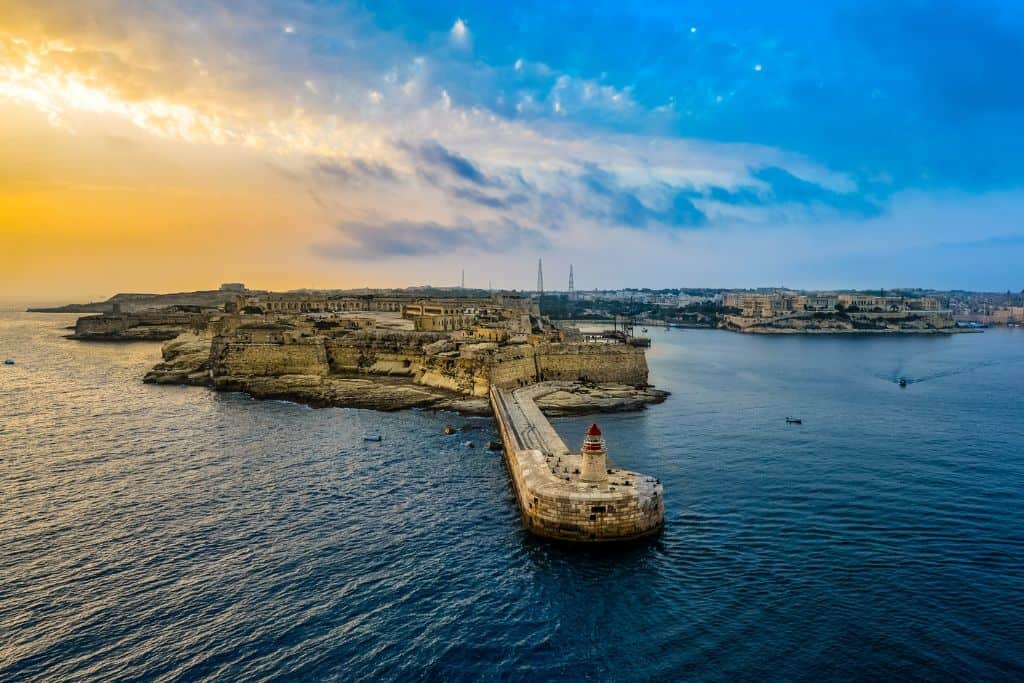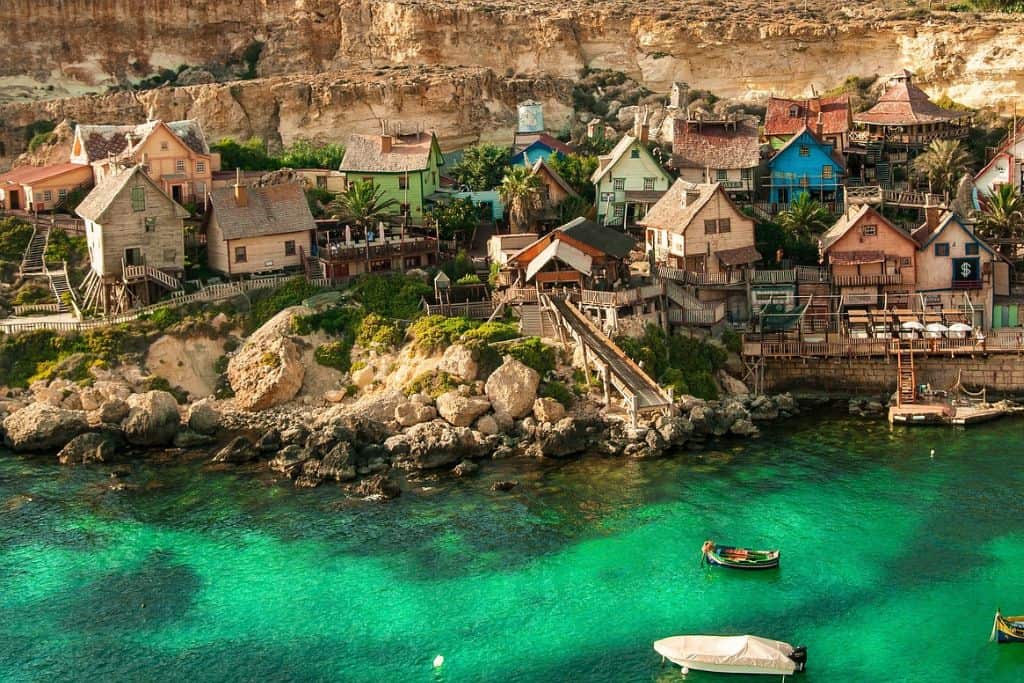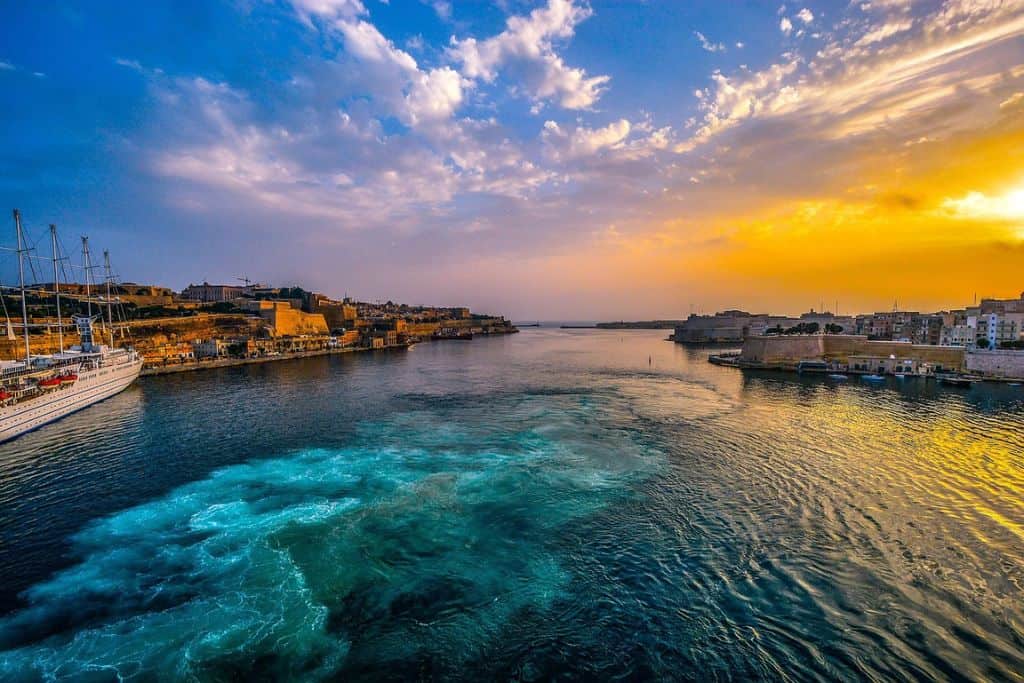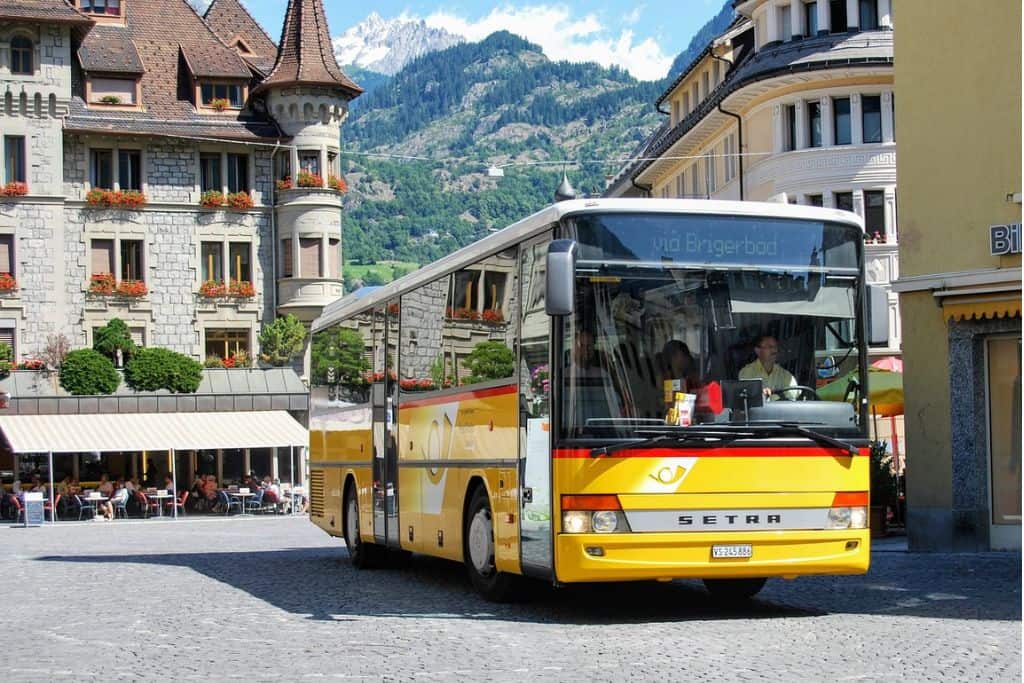
- Country Profile
- Student Life
- Education
- Requirements
- Costs
- FAQs
- prev
- next
- Book Consultation
- Direct message
- Bookmark
- Share
- Report
- prev
- next
Intro
About Study in Malta for International Students

Malta, a stunning island country in the heart of the Mediterranean, is an emerging hub for international students seeking high-quality education in a vibrant and scenic setting. With a blend of European academic excellence and laid-back island charm, Malta offers an enriching experience both inside and outside the classroom. The country is made up of three main islands: Malta, Gozo, and Comino, each known for their breathtaking coastlines, historical landmarks, and welcoming communities.
A key advantage of choosing to study in Malta is its bilingual country, with English and Maltese as official languages. This ensures smooth communication in daily life and academic settings, making it an accessible destination for students from diverse backgrounds. Maltese universities follow European education standards, offering globally recognized degrees in fields such as business, medicine, engineering, and tourism, with opportunities for cutting-edge research in these disciplines.
Beyond academics, Malta’s rich cultural heritage adds depth to the student experience. With a history spanning over 7,000 years, the country has been shaped by civilizations such as the Phoenicians, Romans, Arabs, and British. This diverse past is reflected in its architecture, cuisine, and traditions. Valletta, the capital city and a UNESCO World Heritage Site, is home to stunning Baroque structures, museums, and a lively student scene, making it an inspiring place for anyone planning to study in Malta.
For students, Malta provides a safe and affordable lifestyle. Its Mediterranean climate brings mild winters and long sunny summers, perfect for outdoor activities. The cost of living is relatively low, allowing students to enjoy a high quality of life without excessive expenses.
With prestigious universities, an English-speaking environment, and a rich cultural legacy, Malta offers an unparalleled study experience in a dynamic, well-connected setting.
Why International Students Choose Malta?

- Study in Paradise: Imagine studying in a place where you can take a break from classes to enjoy beautiful beaches, swim in clear waters, or explore hidden spots, all just minutes from your campus.
- Competitive Education and Living: Malta offers affordable tuition fees and living costs, allowing students to enjoy a comfortable lifestyle while managing their budgets effectively.
- Focus on Sustainability: Malta is committed to sustainability, offering courses and academic programs that teach environmental responsibility. Students who choose to study in Malta have the chance to make a positive impact on the planet while gaining valuable knowledge in this important field.
- Personalized Learning Experience: Smaller class sizes foster close relationships between students and faculty, enabling personalized attention and support. This creates a more engaging and effective learning environment.
- Diverse Student Population: Malta welcomes students from all corners of the world, creating a multicultural campus environment. This diversity fosters global perspectives and enriches the overall educational journey.
- Healthcare Excellence: Malta's healthcare system ensures that students receive top-notch medical care whenever needed. This adds peace of mind to the study abroad experience.
- Modern Infrastructure and Facilities: Maltese educational institutions are equipped with state-of-the-art facilities, including advanced laboratories, libraries, and digital resources. These tools enhance the learning experience and prepare students for modern challenges in their decision to study in Malta.
- Friendly and Safe Environment for Students: Malta is renowned for its low crime rates and welcoming atmosphere. Students can feel secure and supported as they pursue their studies in a harmonious environment.
Popular Cities in Malta for International Students

- Msida: Msida is the heart of student life, known for its dynamic atmosphere and convenient location. It offers a variety of budget-friendly accommodations, easy access to public transport, and plenty of cafés and study spots. The city’s vibrant community makes it an ideal place for students looking to balance studies with social activities.
- Valletta: Malta’s capital, Valletta, is rich in culture and history, making it an inspiring place for students. It boasts numerous libraries, museums, and cultural events while providing access to job and internship opportunities. Its well-connected transport system makes commuting to other parts of the island easy.
- Sliema: A modern coastal city, Sliema is known for its stylish lifestyle and lively atmosphere. It has a range of student-friendly accommodations, trendy cafés, and shopping centers. The seaside promenade is perfect for relaxation, while the city’s excellent transport links ensure convenience for students.
- St. Julian’s: Known for its entertainment scene, St. Julian’s is a popular choice for students who enjoy a dynamic and social lifestyle. With its coastal views, variety of restaurants, and numerous recreational activities, it offers the perfect blend of relaxation and excitement.
Malta's Economy: Thriving on Tourism, Tech, and Smarts

Malta's economy thrives on its strategic location, skilled workforce, and diverse sectors. As an EU member since 2004, it has become a key player in financial services, tourism, and technology. Tourism remains a cornerstone, drawing millions annually to its cultural heritage and natural beauty. Meanwhile, Malta is pioneering advancements in fintech and blockchain, earning the nickname "Blockchain Island." The country offers favorable tax policies and business incentives, attracting global investments and fostering growth. Manufacturing, especially in pharmaceuticals and electronics, further strengthens its economic base. Despite limited resources, Malta's adaptive strategies and focus on innovation drive sustained development. Its commitment to diversification and forward-thinking policies make it a dynamic hub for entrepreneurs and businesses, ensuring long-term prosperity while maintaining competitiveness on the global stage.
Weather in Malta
Malta’s weather is one of the most appealing aspects for international students considering the island as their study destination. With a typical Mediterranean climate, Malta enjoys mild, wet winters and hot, dry summers, making it a good place to live and learn throughout the year. Temperatures rarely drop below 10°C in winter, while summer days can reach up to 35°C, offering plenty of days of sunshine for outdoor activities. The average annual sunshine hours exceed 3,000, ensuring bright days even during the cooler months. This pleasant climate allows students to explore Malta's historic sites, enjoy beach outings, or simply relax in its charming squares after classes. While rain is occasional between November and March, it never lingers long enough to disrupt daily life. This is for those seeking a sunny, welcoming environment to balance studies with leisure.
Video
Facts about Malta
Location:
- Malta is an archipelago located in the central Mediterranean Sea, south of Italy, east of Tunisia, and north of Libya.
Time zone:
- CET (UTC+1), UTC+2 during daylight saving time.
Population:
- As of 2025, Malta’s population is estimated at approximately 543,000.
Languages:
- The official languages: are Maltese and English
Capital:
- Valletta
Currency:
- Euro (€).
Student Life in Malta

Malta offers a well-rounded experience for students who want to balance academics with everyday life. Campus life is welcoming, featuring modern facilities, friendly environments, and opportunities to join clubs or groups that suit your interests. You’ll meet students from different backgrounds, creating a diverse and inclusive community that reflects cultural diversity and contributes to a vibrant multicultural society. Outside of class, Malta’s history and natural beauty are just waiting to be explored. Whether you’re visiting ancient sites, enjoying the beaches, or taking in the views from the cliffs, there’s plenty to see. The mild Mediterranean climate makes outdoor activities enjoyable year-round. With reasonable living costs, students can focus on their studies while still experiencing everything the island has to offer. From campus events to local traditions, life in Malta is diverse, engaging, and unforgettable.
Vibrant Campus Life
Campus life in Malta is designed to make international students feel right at home. Universities offer modern facilities, including libraries, labs, and sports centers, providing everything needed for a productive and enjoyable experience. Class sizes are often smaller, allowing for closer interaction with professors and peers, which helps build strong support networks. Students can join various clubs and societies based on their interests, from cultural groups to sports teams, making it easy to meet new friends and explore hobbies. Many campuses also organize regular events, such as workshops, festivals, and social gatherings, ensuring there’s always something happening to keep life exciting.
A Guide to Transportation for International Students

Malta offers a well-connected and affordable transportation system, making it easy for international students to travel around the island. Whether commuting to university or exploring scenic spots, students have several options to choose from.
Public Transport: The Most Affordable Option
Malta’s public transport system primarily consists of buses, operated by Malta Public Transport. Students can benefit from discounted fares with a Tallinja Card, which offers reduced rates for frequent travel. Bus routes cover major cities, universities, and tourist attractions, making them a reliable option for daily commuting.
Cycling: An Eco-Friendly Alternative
With Malta’s compact size and growing cycling infrastructure, bicycles are an excellent option for short-distance travel. Universities and some residential areas offer bicycle parking facilities, and rental services are available at affordable rates.
Car Rentals and Ride-Sharing
While Malta’s roads can be busy, some students prefer renting a car for convenience. International students with a valid driver’s license can rent vehicles for weekend trips or long-distance travel. Alternatively, ride-sharing services and taxis, including Bolt and eCabs, provide flexible travel options, especially for late-night journeys.
Ferries: A Scenic and Practical Choice
Ferries are a popular mode of transport, especially for students traveling between Valletta, Sliema, and Gozo. The ferry services offer quick and scenic routes, often reducing travel time compared to buses.
Walking: The Best Way to Explore
For students living close to their university or in urban areas, walking is a convenient and cost-effective option. Malta’s charming streets, mild climate, and compact cities make walking an enjoyable way to navigate daily life.
Accommodation Options for International Students

When studying abroad, finding the right place to stay is a key aspect of student life. Malta offers a range of accommodation options to suit different preferences and budgets. In this guide, we will explore the differences between on-campus and off-campus housing. Whether you value proximity to campus and convenience or prefer more independence and flexibility, understanding your options will help you make the best choice for your stay in Malta.
- On-campus accommodation offers the convenience of living within or near your university, making it easy to attend classes and access university facilities like libraries and study spaces. Typically furnished with essentials such as beds, desks, and Wi-Fi, on-campus residences may also include utilities and meal plans. This option is ideal for students who prefer proximity to their studies and a strong connection to campus life.
- Off-campus accommodation, on the other hand, provides more independence and flexibility. Students can rent private apartments, and studios, or share homes with others in various neighborhoods around Malta. This option may offer more privacy and space compared to on-campus housing. While rent prices can vary depending on location, off-campus living gives students the freedom to choose their environment and lifestyle, often with the added benefit of exploring different parts of Malta.
Part-Time Jobs for International Students
In Malta, international students have the opportunity to gain valuable work experience while studying to support financial self-sufficiency, as they are allowed to work up to 20 hours per week during the academic term and full-time during holidays. Part-time job options are diverse, ranging from roles in hospitality, retail, and customer service, to opportunities in administrative positions and tutoring. The local economy, especially in tourist-heavy areas, creates a steady demand for part-time workers, providing students with the chance to earn extra income while gaining hands-on experience. Moreover, working in Malta allows students to enhance their language skills and engage with the local culture, all while balancing their academic responsibilities.
Submit an Inquiry
Education in Malta

Malta’s higher education system has evolved into a modern, student-centered framework that aligns with global standards. Historically rooted in traditional disciplines, it now embraces a dynamic approach driven by technology, industry demands, and international collaboration.
The system offers a diverse range of programs from foundational courses to advanced research degrees, primarily through institutions like the University of Malta. Malta participates in the Bologna Process, ensuring its academic qualifications are compatible and recognized across Europe. This enhances the international value of Maltese degrees for both employment and further studies.
Quality is ensured through accreditation by the Malta Further and Higher Education Authority (MFHEA), which upholds rigorous standards for all programs and institutions.
Structure of Higher Education
Malta’s higher education system is structured to meet a wide range of academic and professional needs, offering diverse programs at various levels:
Undergraduate Programs:
- Bachelor’s Degrees: Typically 3 to 4 years in duration. Fields range from arts and humanities to sciences, engineering, and business.
- Foundation Courses: One-year preparatory courses for students needing to meet entry requirements or strengthen their academic background.
Postgraduate Programs:
- Master’s Degrees: Usually 1 to 2 years long, focusing on advanced study and specialization in a particular field.
- Doctoral Degrees (PhD): Research-intensive programs taking around 3 to 5 years, emphasizing original contributions to the field of study.
Vocational and Professional Education:
- Malta offers a wide range of professional diplomas and certificates, often in collaboration with industry partners. These programs are tailored to meet market demands and provide practical skills.
Teaching Methodologies in Malta's Higher Education

Malta’s higher education institutions focus on interactive, student-centered learning. Key methods include:
- Lectures & Seminars: Delivering core knowledge while encouraging discussions.
- Group Projects & Case Studies: Promoting teamwork and practical problem-solving.
- Practical Labs & Workshops: Offering hands-on experience in modern facilities.
- Research & Internships: Providing opportunities for real-world application and industry exposure.
These approaches ensure students develop both theoretical knowledge and practical skills, enhancing their employability upon graduation.
Language of Instruction
Malta’s primary language of instruction in higher education is English, making it an attractive European study destination for international students. As a bilingual country (Maltese and English), Malta uses English as its main teaching medium to align with global standards. Non-native speakers may need to demonstrate proficiency through tests like IELTS, TOEFL, or PTE, with scores varying by institution. Many universities offer preparatory English courses to support students. Using English enhances communication, and prepares students for the competitive global job market, fostering a diverse and inclusive learning environment for academic and professional success.
Academic Calendar in Malta
The academic calendar in Malta follows an internationally recognized semester-based system, designed to provide students with a balanced and structured learning experience. Here’s how it works:
The main academic year is divided into two semesters, with an optional summer term for additional courses or retakes. This structure allows students to focus on their studies while also enjoying breaks for internships, part-time work, or personal leisure.
- Autumn Semester: Starts in late September or early October and runs until January, including exams.
- Winter Break: Usually around two weeks in December and January.
- Spring Semester: Begins in February and continues until May or early June, followed by exams.
- Summer Break: June to September, with some institutions offering summer courses.
While the general framework remains consistent across institutions, specific dates may vary slightly depending on the university or program.
Post-Graduation Employment
Graduates looking to stay in Malta can explore job opportunities in key industries, including:
- iGaming and Technology: Malta is a major hub for online gaming, software development, and fintech companies, creating numerous job openings.
- Finance and Banking: With a strong financial sector, the country offers roles in accounting, auditing, and investment services.
- Tourism and Hospitality: As a leading tourist destination, Malta has a continuous demand for skilled professionals in hotels, travel agencies, and event management.
- Healthcare and Education: There are opportunities for qualified professionals in healthcare services, teaching, and language training.
Work Permits and Residency
Non-EU graduates who wish to work in Malta must apply for a Single Work Permit, which allows them to live and work in the country. Employers often sponsor skilled workers in high-demand sectors, making it easier for graduates with specialized expertise to secure jobs.
Submit an Inquiry
Requirements to Study in Malta for International Students

As a prospective student considering Malta as your study destination, it's essential to understand the necessary steps and documentation needed to make your academic journey smooth and successful. From securing admission to meeting financial and visa requirements, the process involves several key components designed to ensure you're well-prepared for life and learning on the island. Known for its prestigious education system, multicultural environment, and affordability, Malta offers a welcoming atmosphere for students from around the globe. Below, we break down the specific requirements you’ll need to fulfill to pursue your studies in this beautiful Mediterranean nation.
Academic Requirements
To study in Malta, you must meet specific academic and language proficiency requirements, which vary depending on the level of your program.
Undergraduate degrees
To enroll in an undergraduate degree course in Malta, you must have a high school diploma or an equivalent qualification. Some universities may require specific subjects or minimum grades, so it’s important to check the entry requirements for your chosen program.
Postgraduate degrees
For postgraduate studies, you’ll need a bachelor’s degree in a relevant field. Some programs, especially those in specialized areas like business or the arts, may also require work experience or a portfolio.
English Language Proficiency
Since most courses in Malta are taught in English, non-native speakers must provide proof of English proficiency. Accepted tests include IELTS (with a minimum score of 6.0) or TOEFL (with a minimum score of 80).
Admission Documents
To apply for a program in Malta, you’ll need to prepare the following documents:
- A completed application form from your chosen institution.
- Certified copies of your academic transcripts and certificates.
- Proof of English language proficiency (if applicable).
- A copy of your passport.
- A personal statement or statement of purpose.
- Letters of recommendation (usually 2-3).
- A CV or resume (for postgraduate applicants).
Financial Requirements
International students must demonstrate that they have sufficient funds to cover tuition fees and living expenses. This can be shown through bank statements, sponsorship letters, or scholarship awards.
Tuition Fees
Tuition fees in Malta vary depending on the institution and program. On average, undergraduate programs cost between €6,000 and €10,000 per year, while postgraduate programs range from €8,000 to €15,000 per year.
Living Costs
Monthly living expenses, including accommodation, food, and transportation, typically range from €700 to €1,200.
Visa Requirements
Non-EU/EEA students must apply for a student visa to study in Malta. The requirements include:
- A valid passport with at least six months of validity.
- An acceptance letter from a recognized Maltese educational institution.
- Proof of sufficient financial means.
- Health insurance covers the duration of your stay.
- Certificate of Good Conduct
- Payment of the visa application fee (approximately €66).
- Proof of accommodation.
- A recent passport-sized photo.
- Proof of language proficiency (such as IELTS, TOEFL, or equivalent).
- A medical certificate indicating good health.
The visa application process can take up to 2 weeks, so it’s advisable to apply well in advance.
Steps to Apply to Study in Malta
- Choose a Program and Institution: Research universities and programs that align with your academic and career goals. Popular education institutions include the University of Malta and GBS Malta.
- Check Admission Requirements: Ensure you meet the academic and language requirements for your chosen program.
- Prepare Your Application: Gather all required documents, including transcripts, proof of English proficiency, and recommendation letters.
- Submit Your Application: Studygram is here to help guide you through the entire application process, ensuring everything is submitted accurately and on time.
- Apply for a Student Visa: Once accepted, apply for a student visa at the nearest Maltese embassy or consulate.
- Arrange Accommodation: Many universities offer on-campus housing, or you can explore private rentals.
- Travel to Malta: Plan your travel and ensure you have all necessary documents, including your visa and acceptance letter.
Tips for International Students in Malta
- Learn About Maltese Culture: While English is widely spoken, learning a few phrases in Maltese can help you connect with locals and enrich your experience.
- Explore Part-Time Work Opportunities: International students can work up to 20 hours per week during term time and full-time during holidays. This is a great way to gain experience and support yourself financially.
- Join Student Organizations: Engage with student clubs and societies to make friends, build networks, and enhance your overall experience.
- Travel Around Malta: Take advantage of Malta’s small size and explore its beautiful islands, historical sites, and beaches.
Submit an Inquiry
Cost of Living in Malta for International Students

Malta, a stunning Mediterranean island nation, is not only known for its rich history, beautiful landscapes, and English-speaking environment but also for being an affordable study destination for international students. If you’re planning to study in Malta, understanding the cost of living is crucial for budgeting and ensuring a comfortable stay. This guide provides a detailed breakdown of the living costs in Malta, including accommodation, food, transportation, and other expenses, to help you plan your finances effectively.
Breakdown of the Cost of Living in Malta
Below is a comprehensive overview of the monthly expenses you can expect as an international student in Malta:
Accommodation Costs
Accommodation is one of the most significant expenses for students. Malta offers a variety of housing options, including on-campus housing, shared apartments, and private rentals.
- On-Campus Housing: Many universities offer dormitories or student residences. Prices typically range from €300 to €500 per month, depending on the facilities and location.
- Shared Apartments: Renting a room in a shared apartment is a popular option among students. Monthly rents range from €400 to €600, depending on the area and amenities.
- Private Rentals: If you prefer more privacy, a one-bedroom apartment can cost between €600 and €700 per month.
Food and Groceries
Malta offers a wide range of dining options, from affordable local eateries to high-end restaurants.
- Groceries: Monthly grocery expenses typically range from €200 to €250, depending on your eating habits. Local markets and supermarkets offer budget-friendly options.
- Eating Out: A meal at an inexpensive restaurant costs around €10-€15, while a three-course meal at a mid-range restaurant can cost €30-€50.
Transportation Costs
Malta’s public transportation system is efficient and affordable, making it easy to get around the island.
- Bus Fares: A single bus ticket costs €1.50 in winter and €2.00 in summer. Monthly bus passes are available for €26, offering unlimited travel.
- Biking and Walking: Due to Malta’s small size, biking and walking are popular and cost-effective ways to get around.
- Taxis and Ride-Sharing: Taxis are relatively expensive, with fares starting at €10.
Utilities and Internet
If you’re renting a private apartment, you’ll need to budget for utilities such as electricity, water, and internet.
- Utilities: Monthly utility bills (electricity, water, and gas) typically range from €50 to €100, depending on usage.
- Internet: High-speed internet costs around €25-€35 per month. Many student accommodations include Wi-Fi in the rent.
Health Insurance
Health insurance is mandatory for international students in Malta.
- Private Health Insurance: Non-EU/EEA students must purchase private health insurance, which costs approximately €150-€300 per year.
Miscellaneous Expenses
- Entertainment: Movie tickets cost around €8-€10, while gym memberships range from €30 to €50 per month.
- Mobile Plans: Prepaid SIM cards with data plans start at €10 per month.
- Books and Supplies: Budget around €100-€200 per semester for academic materials.
Average Monthly Cost of Living in Malta
Here’s a summary of the average monthly expenses for an international student in Malta:
- Accommodation: €300-€900
- Food and Groceries: €200-€250
- Transportation: €30-€50
- Utilities and Internet: €75-€125
- Health Insurance: €26 (monthly average)
- Miscellaneous: €100-€200
- Total Estimated Monthly Cost: €700-€1,200
Tips to Save Money as a Student in Malta
- Choose Shared Accommodation: Sharing an apartment with other students can significantly reduce your housing costs.
- Cook at Home: Preparing your meals is cheaper than eating out regularly.
- Use Public Transport: Opt for monthly bus passes to save on transportation costs.
- Take Advantage of Student Discounts: Many restaurants, museums, and events offer discounts for students.
- Shop at Local Markets: Fresh produce and groceries are often cheaper at local markets than at supermarkets.
Submit and Inquiry
FAQS
Q: Is Malta a good destination for international students?
A: Yes, Malta is increasingly popular among international students due to its affordable living costs, friendly locals, and opportunities to explore Europe.
Q: Do I need to speak Maltese to study in Malta?
A: No, English is widely used in education, business, and daily life. Most courses are taught entirely in English, so proficiency in Maltese isn’t required. However, learning some basic phrases can enhance your cultural experience.
Q: Is Malta safe for international students?
A: Yes, Malta is generally safe, with low crime rates and a friendly community. Its compact size makes navigation easy, and public transport is reliable and affordable.
Q: What extracurricular activities are available for students in Malta?
A: Malta offers endless opportunities beyond academics:
- Join clubs and societies at your university.
- Explore historical sites like Valletta, Mdina, and Ggantija.
- Enjoy water sports such as snorkeling, diving, and sailing.
- Participate in festivals, concerts, and cultural events throughout the year.
Q: What is the currency in Malta?
A: The official currency is the Euro (€).
Q: Can I work while studying in Malta?
A: Yes, international students can work up to 20 hours per week during term time and full-time during holidays, provided they have a valid work permit.
Q: What is the weather like in Malta?
A: Malta enjoys a Mediterranean climate with mild winters and hot summers, making it an attractive destination year-round.
Q: Are there any preparatory or foundation programs in Malta?
A: Yes, many institutions offer foundation courses for students who need additional preparation before starting their degree programs.


